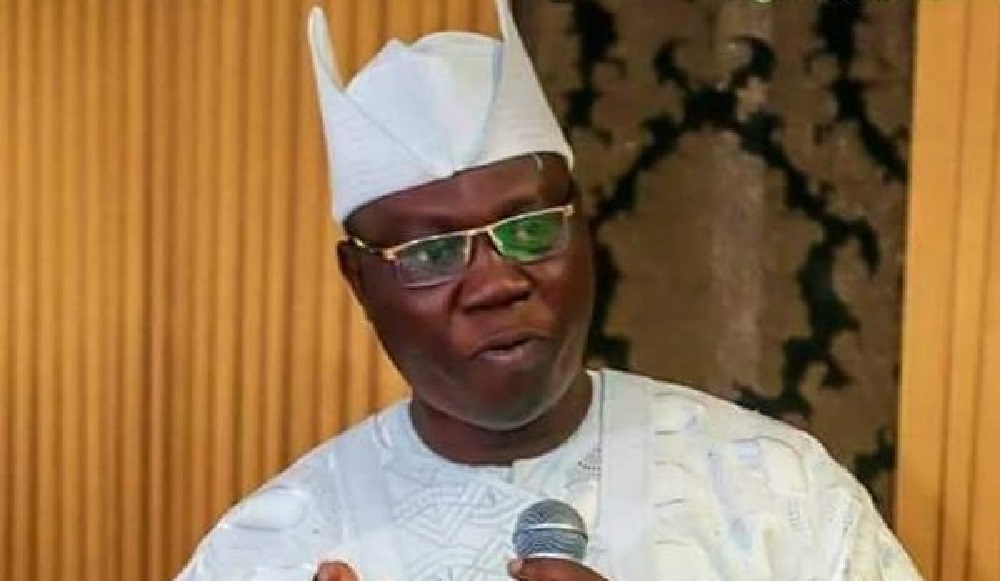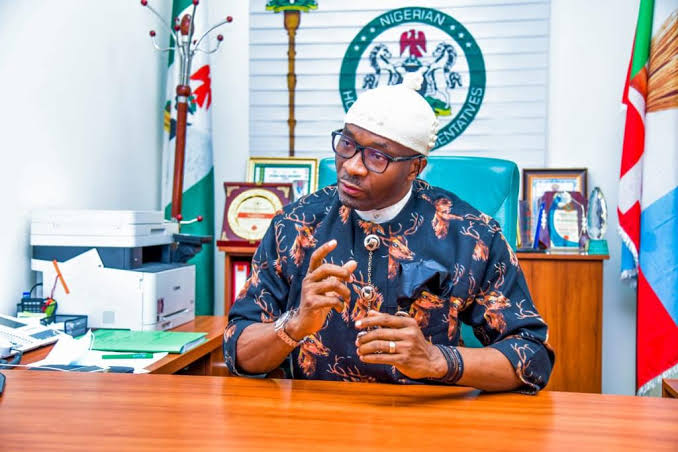News
Gani Adams fumes as Sultan backs Sharia courts in S’West

The Sultan of Sokoto-led Nigerian Supreme Council for Islamic Affairs has thrown its weight behind the push to establish Sharia courts in South-West states.
In a statement on Wednesday titled, “Live and Let Live!” signed by its Deputy National Legal Adviser, Haroun Muhammed, the NSCIA decried what it described as the “high spate of intolerance and disregard for the rights of Muslims, especially in the Southern part of the country.”
The council argued that contrary to the assertion of South-West governors, Sharia courts are backed by the Nigerian Constitution.
The intervention by the NSCIA comes on the back of festering controversies over the creation of Sharia courts or panels in South-West State.
On Tuesday, the Governor of Ogun State, Dapo Abiodun, issued a stern statement rejecting the formation of a Sharia Court in his state.
Abiodun said Sharia courts are not recognised in Ogun State’s legal framework and Nigeria’s constitution and warned the brains behind the Sharia court to halt the formation.
Abiodun’s statement came about a week after his counterpart in Ekiti State, Biodun Oyebanji, kicked against the establishment of a Sharia panel in Ekiti.
Earlier in December last year, an announcement by the Supreme Council for Shari’ah in Nigeria to inaugurate a Sharia court in the Oyo town of Oyo State generated controversy, leading to its indefinite suspension.
Addressing the issue, the Governor of Oyo State, Seyi Makinde, said, “About the establishment of Sharia court in Oyo town, people may try, but for us, I swore to uphold our laws and the Constitution of Nigeria.”
However, the Sultan-led NSCIA, on Wednesday, called on governors and traditional rulers in the South-West to protect and preserve the constitutional rights of Muslims in their respective domains.
The NSCIA described as “unnecessary and unwarranted” the resistance to the establishment of Shariah panel in the South-West, noting that the Sharia Arbitration Panel was a voluntary platform designed solely for the resolution of civil and marital disputes among consenting Muslims.
Muhammed said, “The NSCIA strongly supports the establishment of Independent Shariah Arbitration Panel in Ekiti and Oyo States for the purpose so intended, especially where the Muslims in the states have been denied their constitutional right to a Shariah Court of Appeal in all the states of southwestern Nigeria.
“The council cannot find any legal justification for the unnecessary alarm and unwarranted resistance. All the states in the North have Shariah Courts and some, in addition, have Customary Courts.
“The most recent of this is the development emanating from Ekiti state where the effort of the Muslim community to set up an Independent Shariah (Arbitration) Panel was met with unwarranted resistance and objections from both political and traditional quarters.
“This is coming barely a few weeks after the announcement of the inauguration of a Shariah panel in Oyo State generated unnecessary anxiety thereby leading to its indefinite postponement.
“This and other cases, such as the denial of the rights of female students to wear the Hijab despite a Supreme Court judgment, are nothing but calculated attempts to prevent Muslims in the region from practising their faith.”
The council maintained that the setting up of the panel was legitimate, mentioning that the Arbitration and the Shariah Court of Appeal, just like the Customary Court of Appeal (which all of them have) are provided for in the 1999 Constitution (as amended) of the Federal Republic of Nigeria (see section 275), “confirming the legality of both initiatives. “
“The Independent Arbitration Panel, which is a voluntary platform designed solely for the resolution of civil and marital disputes among consenting Muslims was to fill the inexplicable vacuum created by the failure of the political elite in South-Western Nigeria to establish Shariah Courts, as allowed by the Nigerian Constitution, in South-Western States, despite the huge population of Muslims in the region,” the statement further read.
The NSCIA advised against acts of intolerance for Muslims in the South-West, such as the opposition to the inauguration of a Sharia panel in Oyo and Ekiti States, and the denial of the rights of female students to wear the Hijab despite a Supreme Court judgment.
“The Nigerian Supreme Council for Islamic Affairs under the
leadership of its President-General and Sultan of Sokoto, His Eminence, Alhaji Muhammad Sa’ad Abubakar, CFR, is particularly disturbed about the high spate of intolerance and disregard for the rights of Muslims, especially in the southern part of the country.
“The council calls on the governors and traditional authorities in the southern part of the country, particularly the South-West, to ensure that the constitutional rights of Muslims in their respective domains are preserved and protected. While others are allowed to live, Muslims should also be let live,” the statement read.
‘Sharia Court not new in Ogun’
Meanwhile, the spokesman for the Sharia Arbitration Committee in Ogun State, Mallam Yusuf Oloyede, has clarified that the panel was inaugurated in 2018 and had been sitting at the Egba Central Mosque, Kobiti, Abeokuta, to handle disputes among Muslims.
Oloyede made this disclosure in an interview with The PUNCH on Wednesday, following public reactions to a flier circulating on social media announcing the inauguration of the committee.
According to him, the flier created a false impression that the panel was newly established, whereas it had been operating for over six years.
Oloyede emphasised that the committee does not function as a court but serves as an arbitration panel for Muslims who voluntarily seek resolution of their disputes in line with Qur’anic and Hadith principles.
“What we have is not a court per se but an arbitration committee that has been in existence since 2018. It is for arbitration of issues for Muslims who want such issues heard and resolved according to the Quran and Hadith,” he stated.
He further explained that the panel comprises jurists drawn from different regions of the state, including Yewa, Ijebu, Egba, and Remo, and holds its sittings at Egba Central Mosque.
On whether the committee would discontinue its sessions or review its operations following the Ogun State Government’s recent warning, Oloyede said the matter would be deliberated upon internally.
“We wouldn’t know how the state government’s statement is applicable to us because we are not running a court but an arbitration committee,” he said.
He added that the panel would meet soon to discuss the latest developments and determine the next course of action.
News
A Chat with Janet Odio Okolo: A Mother’s Journey Raising a Child with Down Syndrome

News
Hon. Nnamchi Begins Street Lights Deployment In Isi Uzo(Photos)

Honourable Paul Sunday Nnamchi, representing Enugu East/Isi Uzo Federal Constituency in the 10th House of Representatives, has fulfilled his promise to illuminate communities in Isi Uzo Local Government Area.
The lawmaker has just begun the deployment of high-density solar-powered street lights in Ikem Nkwo, marking the beginning of a massive rollout of the street lamps across the communities in Isi Uzo.
This initiative, which started in Enugu East Local Government Area in 2024, aims to support the fight against insecurity in the state which according to him was to add to what Chief Security Officer of Enugu State Barrister Peter Mba had done to secure the state to attracts foreign investments.
The lawmaker expressed concern over banditry attacks, particularly by herdsmen, in some communities within Isi Uzo and Enugu East Local Government Areas in the recent pasts.
He believes that illuminating these areas with high-density street lights would help address the insecurity adding that he was prioritizing border and farming communities in Isi Uzo, where banditry has displaced residents and restricted farming activities.
Communities in Ikem, Eha-Amufu in Isi Uzo which borders Enugu and Benue State and Ugwogo-Nike in Enugu East have been vulnerable to these attacks due to their strategic locations.
News
May Day: Kalu Hails Workers, Applauds Their Role in Nation Building

By Gloria Ikibah
Deputy Speaker of the House of Representatives, Rep. Benjamin Kalu, has extended warm wishes to Nigerian workers as the country marks the 2025 edition of International Workers’ Day.
Kalu praised workers across various sectors for their commitment and resilience, describing them as the engine that keeps the nation moving. He acknowledged their sacrifices and unrelenting drive, especially during tough economic times.
In his message, he highlighted the efforts of the current administration under President Bola Tinubu to improve the welfare of public servants. He referenced the National Assembly’s prompt backing of the new minimum wage as a sign of the government’s seriousness about workers’ wellbeing.
The Deputy Speaker appealed for continued patience and understanding from Nigerians, noting that the ongoing economic reforms, while challenging, are designed to bring long-term relief and prosperity.
Kalu also called for unity, and said the country can only overcome its present difficulties if citizens and leaders work together in good faith.
He therefore urged workers to keep the faith and remain steadfast in their duties, assuring them that brighter days are on the horizon, and wished Nigerian workers a peaceful and fulfilling May Day celebration.
-

 Metro18 hours ago
Metro18 hours agoGunmen storm University of Benin teaching hospital, kill doctor
-

 Metro18 hours ago
Metro18 hours agoFCTA destroys 601 motorbikes over violations
-

 News10 hours ago
News10 hours agoAlleged money laundering: EFCC produces Aisha Achimugu in court
-

 News18 hours ago
News18 hours agoJust in: FG declares tomorrow public holiday
-

 News11 hours ago
News11 hours agoJUST IN: Major General Paul Ufuoma Omu Rtd, dies at 84
-

 News11 hours ago
News11 hours agoTinubu hails Dangote’s World Bank appointment
-

 News14 hours ago
News14 hours agoSAD! Professor’s son takes own life inside varsity staff quarters
-

 News18 hours ago
News18 hours agoFull list: FG approves N110bn to rehabilitate medical schools 18 institutions























